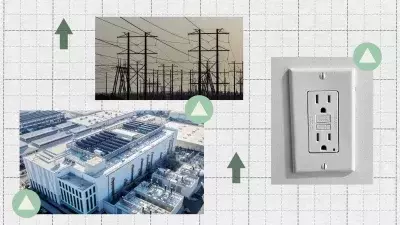
The increasing integration of artificial intelligence into daily life is driving an unprecedented surge in electricity consumption across the United States. This escalating demand, particularly from the proliferation of data centers necessary to power AI, is a significant factor behind the noticeable rise in household electricity bills. This phenomenon is further complicated by the retirement of older power plants, the fluctuating costs of natural gas, and the ongoing efforts by utility companies to modernize and stabilize the power grid.
Understanding the Surge: AI, Demand, and Your Wallet
In November 2025, a critical report highlighted that AI's expanding footprint is a key contributor to the national upswing in electricity demand, leading to higher utility expenses for consumers. This surge is not merely an abstract economic trend; it directly impacts individuals like Kathy Letourneau, a 71-year-old resident of Fort Walton Beach, Florida, who faces monthly electricity bills ranging from $200 to $300. Living on a fixed income, she recounts instances where her power was disconnected due to an inability to pay, underscoring the severe financial strain these rising costs impose on vulnerable populations. Florida, home to a large retired community, has seen residential electric rates climb by over 13% in the past year alone, with further increases anticipated. This issue has become a prominent concern, even influencing recent state elections in New Jersey and Virginia.
The Energy Department's data indicates a substantial 40% increase in electricity prices since February 2020, outpacing the 26% rise in the overall cost of living. This dramatic escalation is largely attributed to the burgeoning demand from AI-driven data centers, alongside a broader shift towards electrification, including electric vehicles and appliances. Utility companies, represented by organizations like the Edison Electric Institute, are actively seeking to expand energy generation capacity using diverse sources such as wind, solar, and natural gas to meet this escalating demand. However, the investment required to build new power infrastructure and enhance grid resilience is projected to exceed a trillion dollars over the next five years, raising questions about who will bear these monumental costs.
A critical debate revolves around whether the power-hungry data centers should fully absorb their energy costs, potentially alleviating the burden on residential users. Experts like Severin Borenstein of U.C. Berkeley's Haas School of Business caution against offering preferential rates to these large commercial consumers, as such policies could inadvertently shift costs onto households. He suggests that requiring data centers to utilize backup power or reroute data traffic during peak demand periods could significantly mitigate cost pressures. While the current growth in electricity demand is substantial, it is not without historical precedent, reminiscent of the 1960s when air conditioning became widespread, transforming daily life and energy consumption patterns.
Reflecting on Our Energy Future in the Age of AI
The escalating electricity bills, fueled in part by the rapid expansion of artificial intelligence, compel us to critically examine our energy infrastructure and consumption habits. This situation highlights an urgent need for a balanced approach that supports technological advancement without disproportionately burdening ordinary citizens. As AI continues to integrate into every facet of our lives, from smart homes to advanced computing, the energy demands will only intensify. This necessitates innovative solutions, not just in power generation but also in energy management and policy-making. We must ensure that the benefits of AI are shared broadly, and its environmental and economic costs are distributed fairly. It is imperative for regulators to implement policies that encourage energy efficiency and responsible consumption among all users, particularly high-demand entities like data centers. Only through thoughtful planning and strategic investment can we navigate this energy transition successfully, securing a sustainable and affordable power supply for everyone.
